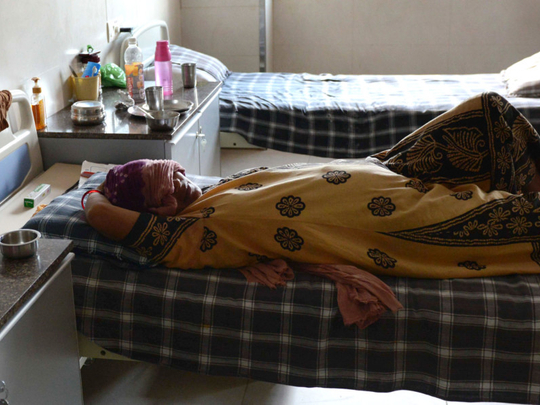
New Delhi
On August 24, India’s external affairs minister Sushma Swaraj announced cabinet approval for the new surrogacy bill. The draft Surrogacy (Regulation) Bill 2016 that aims to safeguard the rights of surrogate mothers, in the process, proposes a complete ban on surrogacy, a practice wherein a woman gives birth to a child for a couple with the intention of handing over the child to them after birth.
The bill bans “commercial” surrogacy wherein the surrogate mother is paid a lump sum amount to bear the child by the couple. It allows ‘altruistic’ surrogacy for Indian couples, which means no monetary benefits, will be provided to the surrogate mother, who, necessarily, has to be a close relative of the couple.
Swaraj not only slammed celebrities for opting for surrogacy out of ‘fashion”, but went a step ahead and said the government is clear that surrogacy is only for those who need it and will not be permitted for reasons such as avoidance of labour pain.
Conflicting views
While the minister added the bill intended to prevent exploitation of women, especially those in rural and tribal areas, and stamp out “womb trade,” there have been conflicting views from women activists and scholars who claim it’s a survival strategy for such women and a way out of their family issues.
However, the government contends there have been incidents concerning unethical practices, exploitation of surrogate mothers, abandonment of children born out of surrogacy and rackets involving intermediaries and unscrupulous elements.
Activist Arunima Shah debates, “It is because commercial surrogacy is banned in several parts of the world that India has become a hub for surrogacy. Low-cost technology, skilled doctors and a ready supply of surrogates have made India a preferred destination for fertility tourism.
“In 2001, commercial surrogacy was legalised in the country and women began demanding between Rs200,000 [Dh11,000]to Rs400,000 to bear a child. But it was being done only to support their families.”
The activist claimed there’s a flurry of activity in many places and NRIs are getting surrogacy done because the Bill will take another year to become law.
In 2014, eminent scientist P.M. Bhargava said: “Twenty million couples in India are infertile.” Supporting his claim, a survey conducted in nine Indian cities a couple of years back found that, of over 2,500 people surveyed, nearly 46 per cent were infertile.
The fact is fertility is on the rise and there has been a 20-30 per cent rise in the last five years. With the surrogacy business valued at Rs9 billion in the country, more than 2,000 surrogate births take place annually.
Manisha, 32, who opted to become a surrogate for a second time, claimed she did so to earn a lump sum amount.
“We enter these arrangements only for special needs. It helped me build a house and fund my children’s education. Surrogacy has empowered me,” she said.
Countering the external affairs minister’s argument of “exploitation”, Meena, 35, said, “If that was the case, so many of us would not be doing it repeatedly. My husband met with an accident four years ago and lost his job as a motor mechanic.
“I bore a child for a couple from the US and bought a small shop for my husband. Given a chance I am still ready to bear a child for any couple, as it would only bring joy to someone’s life.”
Currently, there is an absolute ban on all forms of surrogacy in many nations. To be in league with nations that allow only altruistic surrogacy, the government has now prohibited foreigners from commissioning surrogacy in the country.
An officer in the health ministry said, “Problems arose on finding several children born out of cross-border surrogacy being conveniently abandoned when not given visas.”
While Swaraj described the bill as a “revolutionary step” towards women’s welfare, a young couple from Delhi, contemplating going in for surrogacy, is left wondering what to make of the draft law that proposes ‘altruistic surrogacy’.
“It’s not akin to borrowing your sister or sister-in-law’s outfit for a function or requesting them to share a recipe! The bill has suddenly made surrogacy an impossible option for almost everyone. The government has no right to decide when and how we should have the child,” the wife said.
Strangely, couples married for two years can adopt, but to have a baby through surrogacy they have to (as per the bill) wait for five years. The government’s contention is that the five-year window has been provided to married couples to ensure that the option of having a child through natural means and through Assisted Reproductive Technology treatments has been exhausted.
However, activists feel surrogacy regulation is a distant dream. Citing an example, Shah said, “We have the Pre-Natal Diagnostic Techniques Act, 1994, which was enacted to ban sex selection and put an end to the practice of selective abortion of female foetuses. But how it has failed, is known to all. Similarly, banning surrogacy will only increase corruption and make it just like the kidney transplant business, wherein it has become easy to get a kidney donor through touts.”
She challenged the reasoning of the bill emphasised by Swaraj, who said, “In commercial surrogacy one would just pay the surrogate mother and ensure that the mother and baby never come in touch. But in this (altruistic) case it is an open thing. There are no ethical issues. The child would know who the biological mother is because it is a close relative.”
The activist questioned: “The pertinent point is — will it be a comfortable situation for any child to know who the ‘real’ mother is?”












